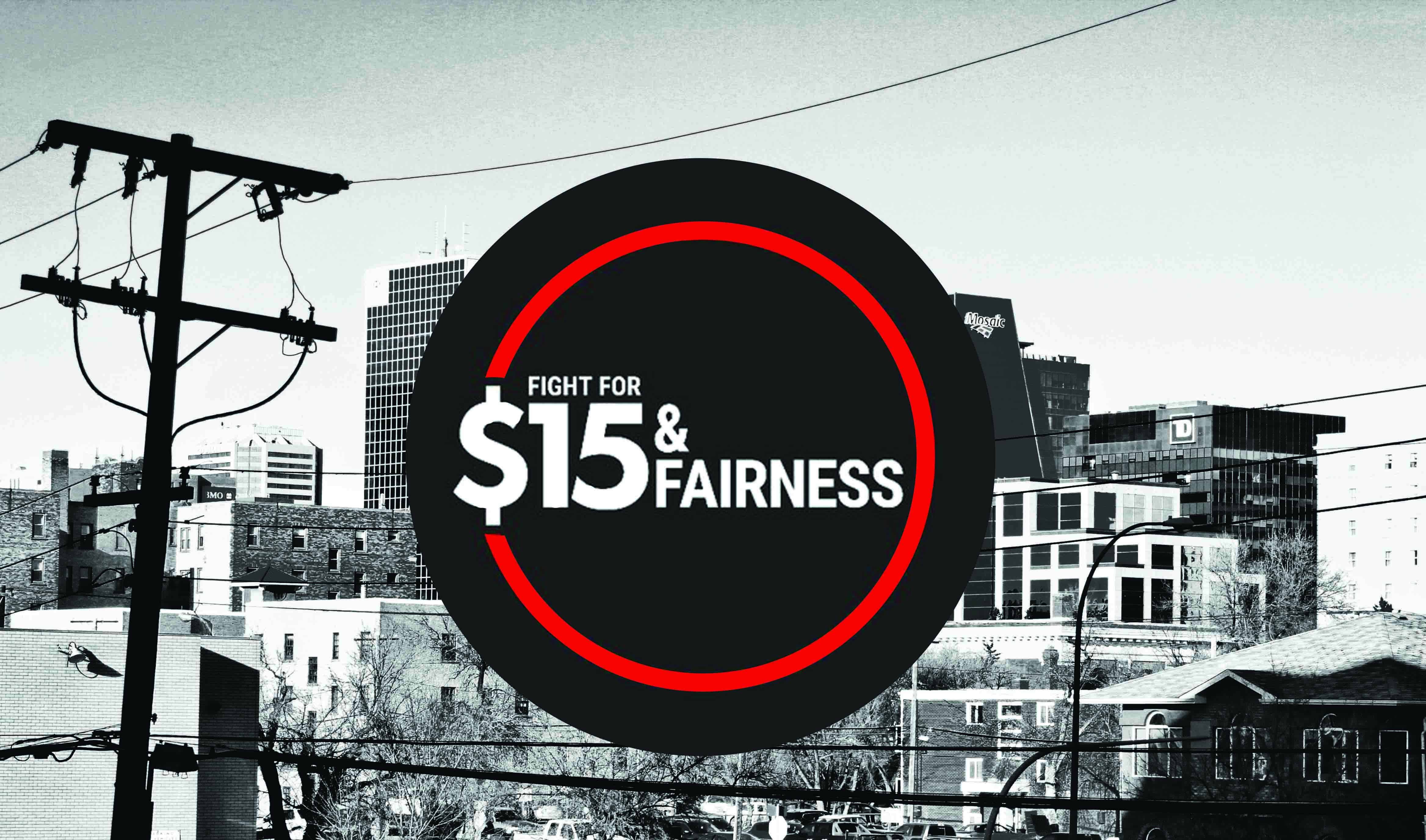The Fight For 15 rages on

author: taylor balfour | news writer

rage for the 15/ jeremy davis
The fight for better pay in Saskatchewan continues at Regina’s Ramada
The fight to increase minimum wage in Saskatchewan is as ripe as ever, and the Saskatchewan Federation of Labour [SFL] is hosting an event hoping to prove such a fight fruitful. Taking place on Nov. 26, the SFL is presenting the “How to win the Fight for 15” meeting at Regina’s downtown Ramada.
“First, we will hear from a panel talk about what a $15 an hour minimum wage would mean for people. Then, we will spend the rest of the meeting sharing ideas on how we can organize to win the Fight for 15 in Saskatchewan!” the event’s Facebook page says.
The page also explains the three speakers presenting at the event: Lori Johb, the president of the SFL, Simon Enoch from the Saskatchewan branch of the Canadian Centre for Policy Alternatives, and the U of R’s own Jermain McKenzie, URSU’S acting president and vice-president of student affairs.
“It’s kinda like an informal way of bringing some people together to have a discussion around the importance of a $15 minimum wage,” Lori Johb says explaining the event. “I think that it’s kind of a jumping off point at the Federation of Labour because it’s important for us to join this campaign and to join this fight and our goal would be to win fair wages and decent work for all workers.”
“The Fight For 15 is a campaign that’s going across Canada, but it’s also been happening in the United States for some time as well, and it’s about winning a fair minimum wage,” Johb continues.
“We believe that people that earn minimum wage should not be so far below the poverty line and we’re seeing that happening here for sure, but it’s also important to talk about having decent work and safer workplaces.”
“I think that a $15 minimum wage would bring stable work to people because people would be more likely to stay in their jobs instead of having to work several different jobs to earn a living, so I think that those are kind of things that are really important.”
Saskatchewan’s Fight For 15 also has a website, which they use to spread more information about the cause, as well as debunk myths spread by those against the $15 minimum wage.
They debunk the idea that the increase would eliminate jobs, explaining that “economists have studied the effects of wage increases for many years” and that the “evidence and experience have shown that the job losses predicted by business groups have never actually occurred.”
“If your business model depends on paying workers poverty wages, then your business model is broken,” they state, and explain that “raising wages reduces employee turnover, which means lower orientation and training costs.”
“In fact, the money saved on training more than makes up for the cost of higher wages.”
At the root of the cause, Johb hopes that the campaign will be able to better serve those who are financially struggling in minimum wage jobs.
“I think that this campaign would come a long ways to helping people that are in precarious working situations.”
In specific, however, Johb hopes that their campaign and fight will attract students and will draw them to feel more involved.
“I think it’s really important if we can get some students out to become part of the conversation,” Johb explains. “I think that in a lot of ways they’re affected maybe greater than other people when it comes to minimum wage because often they’re the ones that are working the precarious jobs.”
“We’re hoping to have a couple of days in the two big universities: the U of R and the U of S sometime in January,” she continues. “But to actually get some students on board with us that would be able to sit at a table, talk about the $15 minimum wage, encourage people to visit our website, sign a petition, and those kind of things. So we’re really hoping to engage students in our campaign.”
Students really are the ones feeling the heat of a low minimum wage. The Ontario Association of Food Banks reported “university students and grads are using food banks more than ever.”
Closer to home, the University of Saskatchewan looked into the food insecurity of students in December 2017 and, sampling 20 per cent of the student body, found that 7.5 per cent of those surveyed were in severe food insecurity, “where students are skipping entire days’ worth of meals to help cope with the issue” of having financial struggles.
In this same study, 21.1 per cent of those surveyed were discovered to have moderate food insecurity, while 11 per cent had marginal.
If U of R students want to get more involved for the Fight For 15, Johb says there are plenty of ways to do that.
“There are several different campaigns going on, but frankly, its all with the same goal,” she explains. “The students that want to get involved can contact us at the SFL and we’ll certainly be able to help them in any way that we can to encourage them to be more involved,”
“We’re really hoping to reach target communities,” Johb continues. “And there really is no better group than students for that to happen.”
Most importantly, Johb wants to make sure that students, and the rest of the province, know that this is an issue close to the SFL’s heart.
“It’s really important for the Federation of Labour to be seen as being involved in this campaign; it’s something that’s really important to us.”
“Ever since I’ve become elected as president, which only happened at the end of October, this is one of the priorities on my list: to get involved with this campaign and to really make sure that we’re fighting hard to increase the minimum wage in Saskatchewan.”








